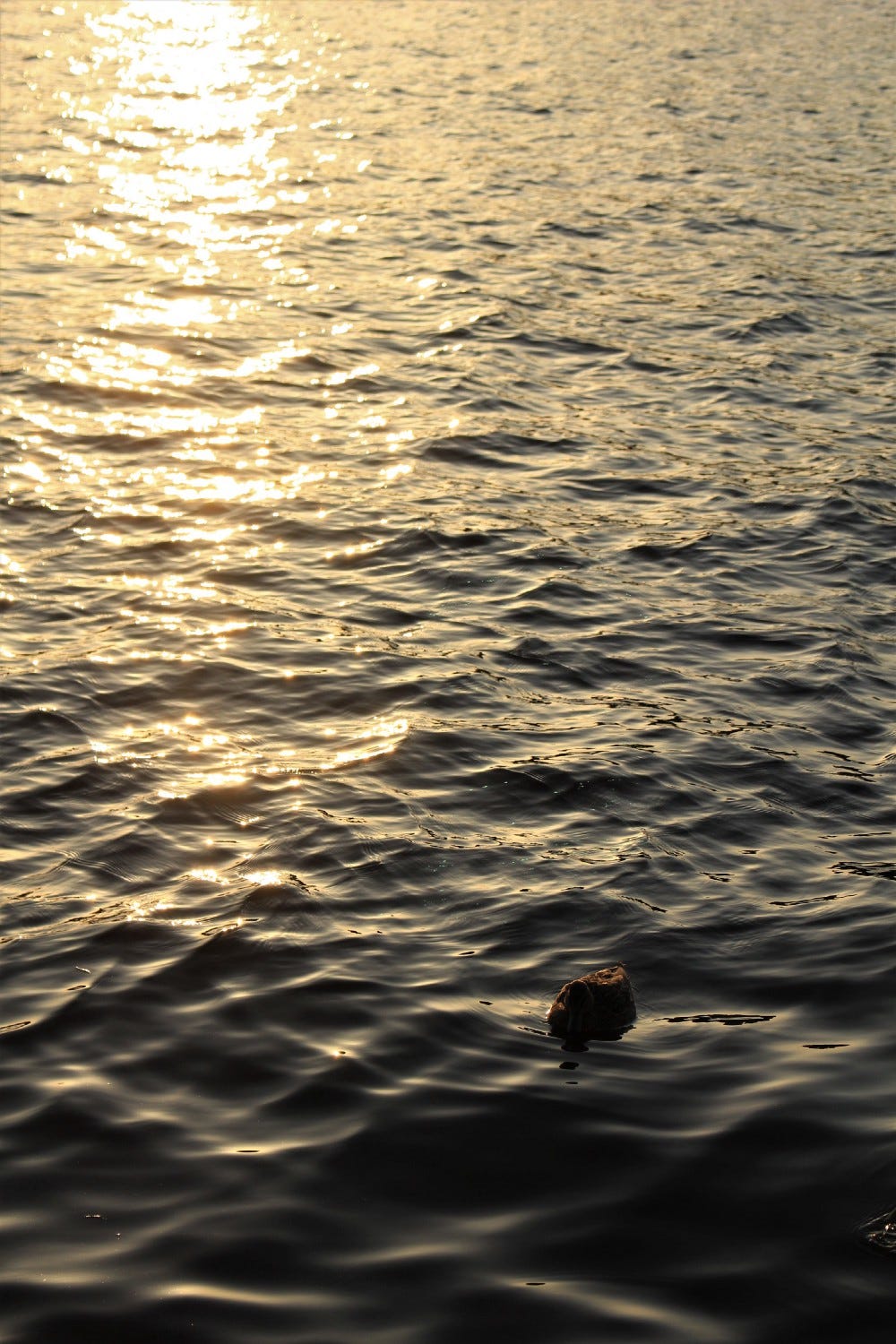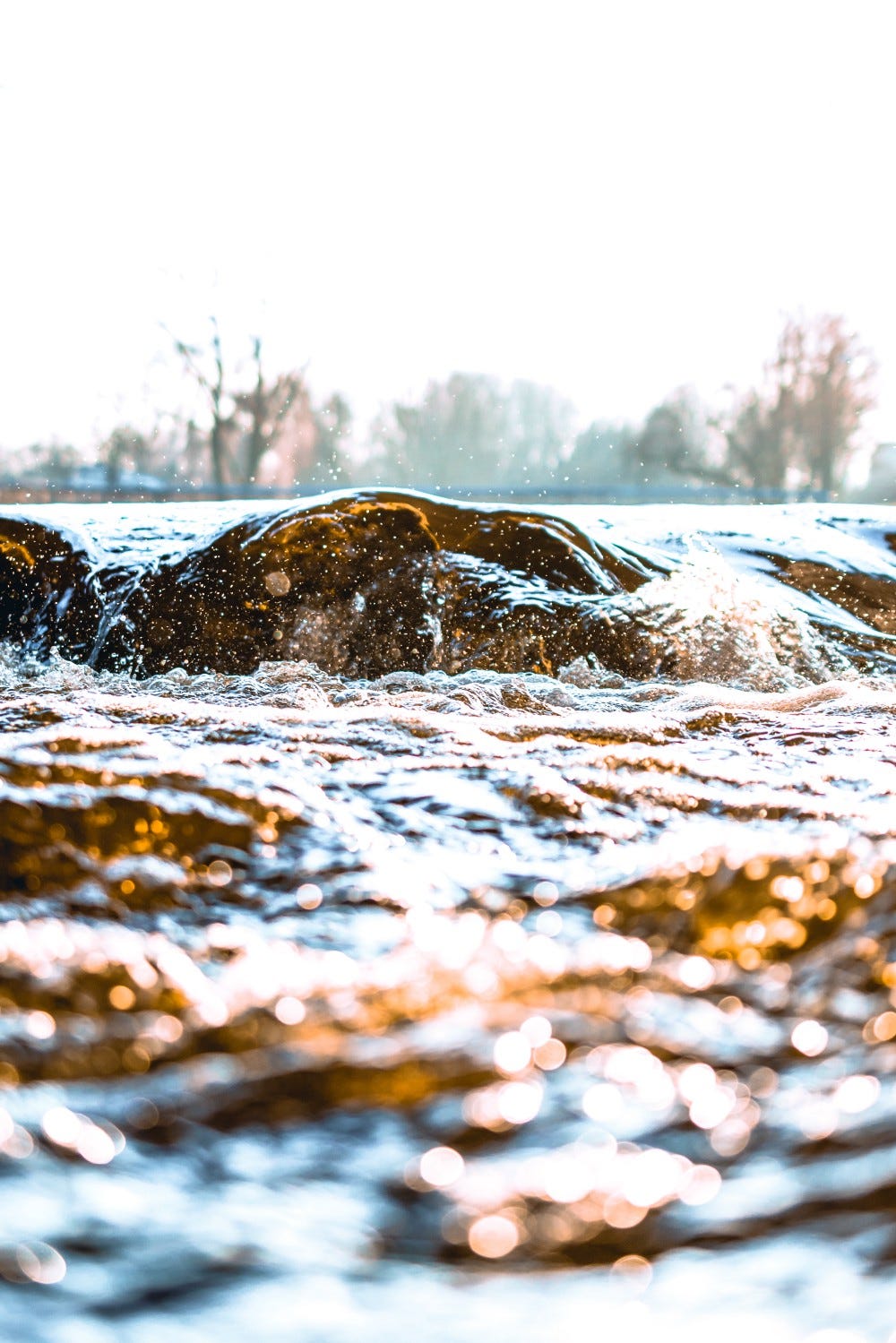How Do I Love Water? Lemme Write a Post About It
I don't just want to be in water, I want to BE it

Water is my favourite element.
The other three have a lot to offer for sure: there’s the excitement, intensity and passion of fire, the solidity, reliability and malleability of earth, air’s association with breath, spirit and the answers that are blowing in the wind.
But there’s something about water. There’s the incredible variety of forms it can take, from ice all the way to mist with the crashing waves, still pools and running rivers in between. There’s all the different sounds that go with all these forms and movements — hissing, splashing, trickling and babbling. Then there’s the incredible interactivity water has. You can sit in a pool or jacuzzi and instantly feel calm, or run headlong into a tall wave and feel it crash around you, or dive deep into the sea, or swim along the surface, or thrash and splash about, or run your arm along the skin of the water to make a spray, or plunge yourself just below the surface and feel the bubbles tickling your face. Water is there to be enjoyed.
That’s given the substance a gentle reputation, but it always amazes me to think that the violent storms that threaten boats at sea and the water you use to drink and bathe in are the same substance.
I’m even more amazed by the way playing in the waves makes me feel like a kid. There’s a sense of weightlessness, endless movement, total freedom, total spontaneity, joy, liberation from the ploddingness and heaviness of earth. I act on every impulse without consequences, play with my surroundings rather than getting something from them or imposing my will on them. There’s no duty in the sea and no goal to reach. You’re just there.
It always feels sort of strange to leave the sea and return to the solidity of the shore, like leaving the essential nature of things behind and returning to the world of appearances. I don’t know enough about biology or psychology to speculate on whether we carry a collective memory of our underwater ancestors around with us, but it definitely wouldn’t surprise me if being in the sea reminded us of our time in the womb — a time when everything was provided for us, we didn’t have to plan or strive, and we could move our limbs with pure directionless freedom.
Or maybe the feeling of being in the water is just similar to the feeling of being on holiday. You’re in a space so different from your normal environment that you can leave behind all the little guilts, duties and practicalities that make up everyday life and experience that Garden of Eden state of appreciating the world immediately and directly. The sensation of being submerged in a vast expanse and swimming through it without resistance, being caressed on all sides, is a powerful metaphor for the ego-free experience of the world.

So it’s no wonder water is probably the most important element in Taoism, Buddhism and Christianity. In the Gospels the fact that water is used to wash away physical dirt and grime is extended out into the idea of baptism, which washes away spiritual sin (doing for the individual what the Flood is supposed to have done for the planet at large). If baptism emphasises water’s purifying function, then the book of John’s concept of “living water” draws on the element’s refreshing and life-sustaining properties.
In Siddhartha, Herman Hesse’s fable about the search for enlightenment, the title character learns everything he needs to know about life from watching and listening to a river. The first thing he notices is that the river is simultaneously always moving and always in the same place — a paradox suggesting that stability, permanence and the forward passage of time are illusions.
As Siddhartha goes about earning his living and raising his son next to the river, we’re told that every time he takes something too seriously or tries too hard to impose his will on a situation the river starts laughing at him. Finally, after years of listening to the river Siddhartha discerns an infinity of voices in its babbling, symbolising the oneness of everyone that has ever existed or will exist. This unity encompasses not just every person but every version of every person as they change and grow throughout their lives. Past, present, future, me, you, them, all one.

Taoism, the “philosophy of flow”, also recommends we take our cues from water. Tao Te Ching chapter 8: ‘True goodness is like water. Water’s good for everything. It doesn’t compete. It goes right to the low loathsome places, and so finds the way’. You can read an endless amount of advice into those four sentences: be flexible; adapt to every situation; be useful to everyone; don’t compare yourself with anyone else or pit yourself against them; find creative ways around every obstacle; be humble; don’t worry about losing status or respect as long as you’re on the right path. Later in chapter 35, the Way is compared to drinking water, simultaneously boring and essential: ‘if you taste the Way it’s flat, insipid…And yet you can’t get enough of it’.
In other chapters water is valued for both its clarity (‘Can you keep the deep water still and clear, so it reflects without blurring?’) and its lack of it (‘Most people are so keen. I don’t have the answers. Oh, I’m desolate, at sea, adrift, without harbour’). Rivers symbolise inexhaustible renewal (‘Being the world’s riverbed of eternal unfailing power is to go back again to be newborn’), “leading from below” (‘Lakes and rivers are lords of the hundred valleys. Why? Because they’ll go lower’) and the effortless “doing without doing” that lies at the core of the book (‘What’s softest in the world rushes and runs over what’s hardest in the world’).
Clearly, the author or authors of the book were as enamoured of the diversity of water as I am — the usefulness of drinking water, the depth of lakes, the overwhelmingness of the sea and the unceasing movement of rivers all represent wildly different aspects of the Way. Notice how the eternally recurring youth of the river of Tao ties in with Siddhartha’s observations about impermanence and the illusion of time?
Finally, towards the end of the Tao Te Ching a lot of the themes and paradoxes that have gone before — the weak overcome the strong, to lead is to follow, power comes from flexibility rather than force — are summarised by the metaphor of erosion: ‘Nothing in the world is as soft, as weak, as water; nothing else can wear away the hard, the strong, and remain unaltered’.
In his YouTube video “Taoism: The Philosophy of Flow”, Einzelgänger points out that water has no goal but still nourishes everything it passes. Similarly, when we’re in the “state of flow” we forget about objectives and results and find ourselves completely immersed in what we’re doing. The video ends on yet another river metaphor: when we dwell on past mistakes, worry about the future or attempt to control our environment we’re swimming against the current and grabbing at the reeds. But when we let go of ruminating, fretting and calling the shots we’re free to commit ourselves to the present, following the course that’s been laid down for us and swimming with the current. Going with the flow.

So there you have it: earth, air and fire are great and everything, but they don’t quite give you water’s crash course in everything that makes life worthwhile — freedom, openness, expanse, movement, vitality, refreshment, nourishment, mystery, danger, joy, peace, spontaneity, play, impulsiveness, presence, depth, clarity, persistence, adaptability, immersion, oneness, impermanence, renewal, laughter, flexibility, humility, usefulness, softness, power, the cycle of life, and so on and on and on from the river to the sea to the clouds to the rain to the waterfall to the lake to the river to the -





